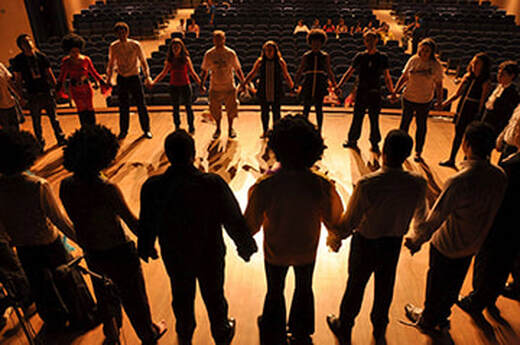Chapter 11 Build a Music Community
"America is hungry for whatever it was that once made this a wonderful place. They want calm and peace and community, and there’s no better canvas for that than music. We’re going to build a front porch around the world. On a front porch, the community sings as one."
— Michael Johnathon, folksinger and SongFarmer
— Michael Johnathon, folksinger and SongFarmer

Being a musician is about more than playing an instrument—it’s about creating a life with other people in a musical circle. You can join that circle as a listener, a singer, or an instrumentalist. You can join it as a teacher, a performer, a songwriter, a sound engineer, a radio DJ, a concert promoter, or a music therapist. The more you engage, the more you help make music an integral part of our world.
Community orchestra leader Scott Walter sees the role we play in our communities as analogous to the one we play in an ensemble. “If I’m hearing the bass, I want to hear the beat of the drummer, I want to hear the bass player’s fundamental, and I’m going to play off of that,” says Scott. “It’s the same thing in a community.
Whether you play in the group or support the group, what part do you like to play? You can get involved with an orchestra or a band, and even while you’re learning, volunteer or help them. Be part of it. Make it happen.”
Wherever we live, no matter what level of musicianship we possess, we can add to the music in our communities. We can create jam groups or publicize them, develop song or drum circles, host house concerts, support songwriters, or promote visiting musicians. We can play music in schools, at community events, at hospitals, or at senior centers. We can teach an instrument to children, to veterans, to novice adults.
In the process, we not only enrich our own lives and get greater inspiration for our own music—we improve the world around us. We find our voice, and we find our niche.
Community orchestra leader Scott Walter sees the role we play in our communities as analogous to the one we play in an ensemble. “If I’m hearing the bass, I want to hear the beat of the drummer, I want to hear the bass player’s fundamental, and I’m going to play off of that,” says Scott. “It’s the same thing in a community.
Whether you play in the group or support the group, what part do you like to play? You can get involved with an orchestra or a band, and even while you’re learning, volunteer or help them. Be part of it. Make it happen.”
Wherever we live, no matter what level of musicianship we possess, we can add to the music in our communities. We can create jam groups or publicize them, develop song or drum circles, host house concerts, support songwriters, or promote visiting musicians. We can play music in schools, at community events, at hospitals, or at senior centers. We can teach an instrument to children, to veterans, to novice adults.
In the process, we not only enrich our own lives and get greater inspiration for our own music—we improve the world around us. We find our voice, and we find our niche.